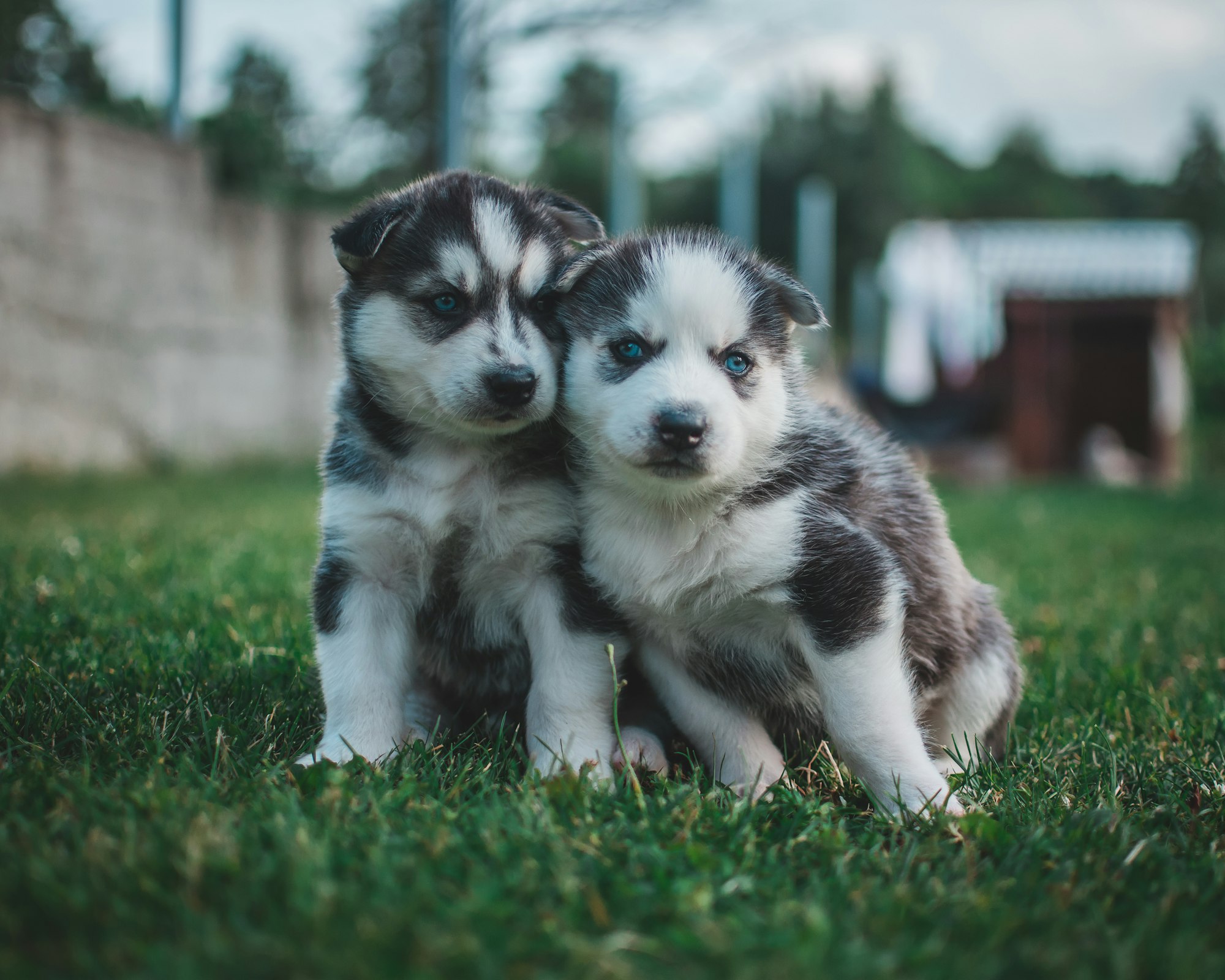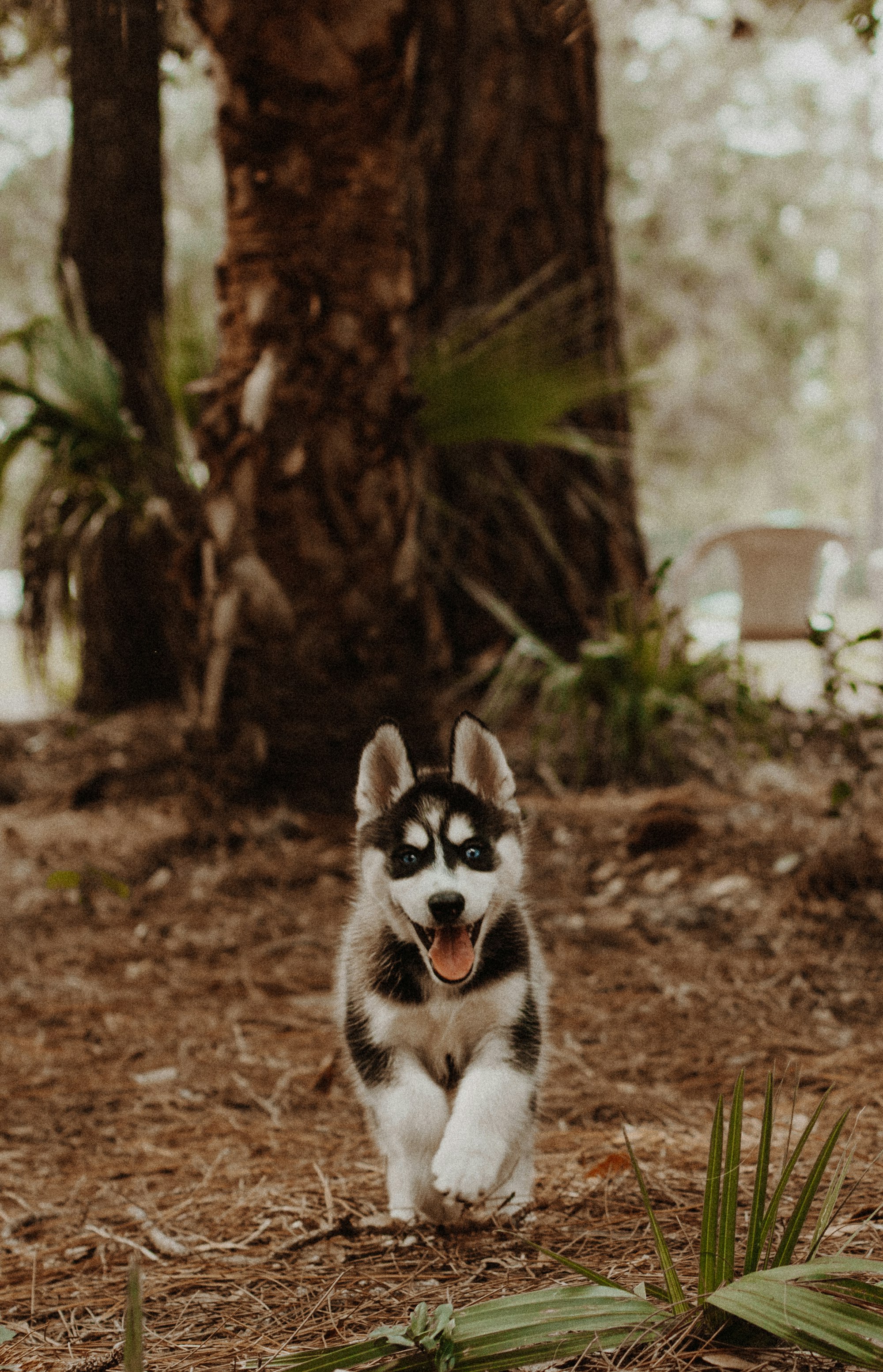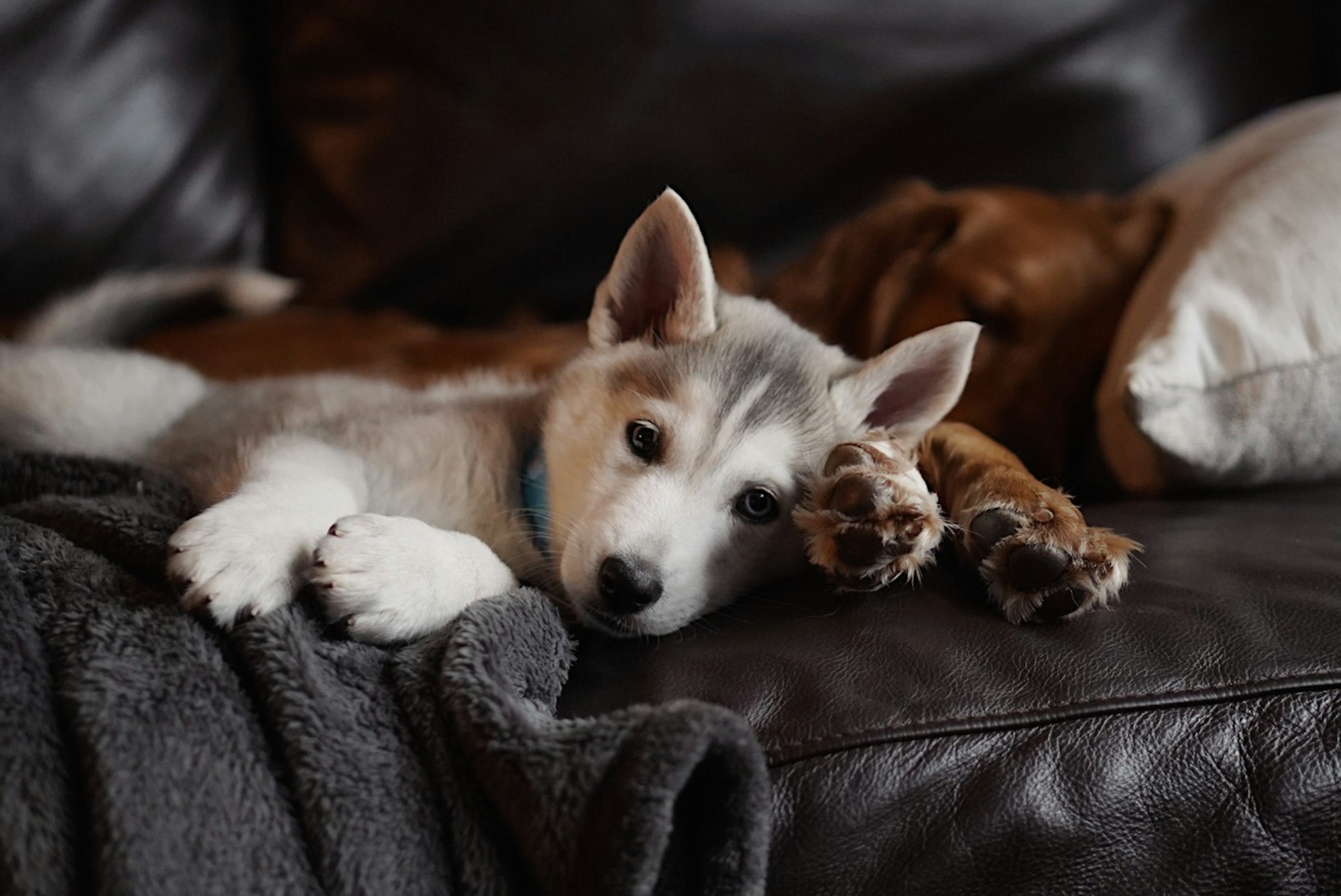Ah, huskies! Those majestic creatures with piercing blue eyes, fluffy coats, and a heart of gold. Whether they're pulling sleds across the Alaskan tundra or snuggling up with their humans, huskies never fail to steal our hearts. But, there's one question that has been puzzling dog lovers for generations - just how many puppies do huskies have? Well, hold onto your paw-sitive vibes, because we're about to uncover the answer to this fur-bulous mystery!
From the number of puppies in a litter to the factors that can influence their size, we'll cover it all. So, sit back, grab a treat (for you and your pup!), and get ready to discover everything you need to know about husky puppies. Trust us, this article is going to be a real paw-some ride.
Secure Your Energetic Husky with the Fi Dog Collar
Dive into the fascinating world of huskies, those enchanting creatures with boundless energy and captivating blue eyes. As sled pullers or cuddly companions, their charisma is undeniable. Are you curious about how many puppies they can have? Huskies typically birth 4-6 puppies, though litters can range from one to twelve pups, influenced by age, health, and genetics.
For young, vibrant huskies, larger litters are common, while older ones may have fewer pups. Health and genetics play crucial roles too, affecting litter sizes variably. If you're contemplating breeding, it's wise to wait until your husky is 18-24 months old for optimal health. Remember, while breeding offers the miracle of life, it's pivotal to prioritize the well-being of the mother and her puppies. And for every husky owner, keeping your spirited friend safe is a top priority.
Use code HUSKY20 to get $20 off the Fi Dog Collar—an invaluable tool equipped with GPS tracking and a geofence feature, ensuring your husky's safety and giving you peace of mind. With the Fi app, monitor your furry friend's activity and sleep, ensuring they're healthy and secure. Invest in the Fi Dog Collar today and embrace a worry-free adventure with your husky!
How Many Puppies Can a Husky Have?
Typically, huskies can have litters of 4 to 6 puppies, although litters as small as one and as large as twelve have been reported. The average litter size for huskies is around 5 to 6 puppies. This large litter size is due to the breed's origin as sled dogs where it was advantageous to have a larger team of dogs to help with the work.
It's important to note that the number of puppies a husky has can be influenced by several factors such as age, health, and genetics. Older huskies tend to have smaller litters, while younger, healthier dogs tend to have larger ones. Additionally, the size of the litter can also be influenced by the female's genetics and her overall health.

What Influences How Many Puppies a Husky Can Have?
There are several factors that can influence the number of puppies a husky can have in a single litter. Some of the main factors include:
Age
Younger, healthier female huskies tend to have larger litters than older dogs. As a husky ages, her ability to carry and deliver a larger litter may decline. This is due to the decline in reproductive hormones, changes in the uterus and other physical factors that may make it more difficult for her to carry a large litter.
Genetics
The size of the litter can be influenced by the female's genetics. Some huskies may have a genetic predisposition to having larger or smaller litters, which can be passed down from generation to generation.
Health
A husky's overall health can greatly impact the size of her litter. Dogs that are well-nourished and in good health tend to have larger litters. On the other hand, dogs that are experiencing health issues such as malnutrition, hormonal imbalances, or other health problems may have smaller litters. Health also means that the Husky is being well groomed and fed.
Breeding History
If a husky has had a large litter in the past, she may be more likely to have a large litter again. Conversely, if she has had smaller litters in the past, she may have smaller litters in the future. This could be due to a variety of factors, including the physical and physiological changes that occur in the body over time.
Hormonal imbalances
Hormonal imbalances, such as low levels of progesterone, can impact the number of puppies a husky can have. Progesterone is a hormone that plays a crucial role in the reproductive cycle of dogs and low levels of this hormone can result in a smaller litter size.
It's important to note that the exact number of puppies a husky will have can vary from litter to litter and can be influenced by a combination of these factors. However, on average, huskies tend to have litters of 4 to 6 puppies.
To maximize the chances of having a healthy and large litter, it's important to ensure that the female husky is in good health and to choose a reputable breeder who takes good care of their breeding dogs.

At What Age Can A Husky Become Pregnant?
A female husky can become pregnant at the age of 1 year, although it's generally recommended to wait until she's at least 18 months to 2 years old before breeding her for the first time. This is because huskies are still physically maturing at the age of 1 year and breeding them too early can increase the risk of health problems and complications during pregnancy and delivery.
It's also important to note that a female huskie's fertility declines as she ages, so it's generally best to breed her while she's still young and in good health. However, it's always best to consult with a veterinarian to determine the optimal age for breeding your husky, as this can vary based on individual circumstances.
The ideal age for a female husky to become pregnant is typically between 18 months to 2 years old, but it's important to consult with a veterinarian to determine the best time to breed her based on her individual health and circumstances.
How Many Litters Can a Husky Have?
The number of litters a husky can have varies based on several factors, including her age, health, and breeding history. On average, a female husky can have 2 to 3 litters in her lifetime. However, some huskies may be able to have more or fewer litters, depending on their individual circumstances.
It's important to note that repeated breeding can take a toll on a female huskie's health and can increase the risk of complications during pregnancy and delivery. To ensure that your husky remains healthy and to reduce the risk of complications, it's generally recommended to limit the number of litters she has throughout her life.
It's also important to consider the fact that there are already millions of dogs in shelters waiting for homes. Breeding more dogs contributes to pet overpopulation, which can result in dogs being homeless, neglected, or surrendered to animal shelters.
From an ethical standpoint, it may be more responsible to support existing dog shelters and rescue organizations instead of adding to the pet overpopulation problem. Adopting a dog from a shelter or rescue organization not only saves a life, but also helps to reduce the burden on shelters and makes room for other dogs in need.

What Factors Changing Litter Size In Huskies?
The size of a husky's litter is determined by a complex interplay of several factors, including age, physical size, health, and genetics. Understanding these factors can help pet owners make informed decisions about breeding their huskies and anticipate what to expect when their dog is expecting.
Age
As a female husky gets older, her fertility may decline, which can result in smaller litter sizes. This decline in fertility can also be accompanied by an increased risk of complications during pregnancy and delivery, so it's important to consult with a veterinarian to determine the best time to breed a husky based on her individual circumstances.
Physical Size
Larger female huskies may be able to carry more puppies than smaller huskies, which can result in larger litter sizes. This is because a larger uterus can provide more space for the puppies to grow and develop. However, larger litters can also put more strain on the mother's health, so it's important to keep an eye on her and to provide adequate support and care throughout the pregnancy.
Health
A husky's health can play a role in the size of her litter. If a female husky is unhealthy or has certain health conditions, it can affect her ability to carry a full litter of puppies. For example, conditions such as hormonal imbalances, autoimmune disorders, or reproductive problems can all impact a husky's fertility and the size of her litter. It's important to keep your husky healthy and to monitor her for any signs of health problems throughout her life.
Genetics
The size of a husky's litter can also be influenced by genetics. Some huskies may have a genetic predisposition to producing larger or smaller litters. This can run in families and may be passed down from generation to generation. Understanding the genetics of your husky's breed can help you make informed decisions about breeding and anticipate what to expect in terms of litter size.

How Can I Tell How Many Puppies My Pregnant Husky Is Carrying?
Ultrasound
An ultrasound is one of the most accurate ways to determine the number of puppies a husky is carrying. This non-invasive procedure uses high-frequency sound waves to create images of the uterus and the puppies inside. A veterinarian can perform an ultrasound during the early stages of pregnancy to get an accurate count of the number of puppies.
Palpation
During a physical examination, a veterinarian can use their hands to gently feel the uterus and count the number of puppies. This is known as "palpation." This method is most effective during the later stages of pregnancy when the puppies have grown and are easier to feel.
X-rays
X-rays can also be used to count the number of puppies a husky is carrying. This method is most effective during the later stages of pregnancy when the puppies' skeletons have developed and are visible on the X-rays.
It's important to note that these methods are not foolproof, and there is always a small margin of error. Some puppies may be hidden behind others or too small to be detected, so the actual number of puppies may be different than what was estimated.
Husky Litter Sizes Compared to Other Breeds
Husky litter sizes can vary greatly, but on average, they typically range from 4 to 6 puppies. This is relatively larger than the average litter size of other dog breeds. However, it's important to note that litter size can vary widely among different individuals, and even within the same litter, so it's not always possible to predict the exact number of puppies.
Compared to other breeds, huskies are generally larger in size and have stronger, more muscular bodies, which can contribute to their ability to carry larger litters. However, it's also important to consider that the health and well-being of the mother and her puppies is the most important factor, and larger litters can put more strain on the mother's health and increase the risk of complications during pregnancy and delivery.
How Long Is a Husky Pregnancy?
The average length of a husky pregnancy is 63 days. However, it's important to note that this can vary slightly, and some huskies may have shorter or longer pregnancies.
It's also important to keep in mind that the exact length of a husky's pregnancy can be difficult to determine, as it can be challenging to pinpoint the exact date of conception. As a result, it's common for veterinarians to use an estimated due date based on the date of the first mating or the date of a positive pregnancy test.

Conclusion
In conclusion, huskies are known for their larger litter sizes compared to other breeds, with an average of 4 to 6 puppies. The length of a husky pregnancy is 63 days on average, but can vary slightly. It's important to consider the mother's health and well-being, and to work with a veterinarian to determine an estimated due date and ensure the best possible outcome for both the mother and her puppies. Understanding the unique traits of huskies can help ensure the health and happiness of this fascinating breed.
Get more expert advice on pet-parenting by visiting the Off Leash blog at TryFi.com.
TryFi's The Fi Dog Collar is a must-have for any pet parent, it's a GPS tracking collar that helps you keep tabs on your dog's location, activity, and sleep patterns, and alerts you if they escape your backyard. Try the Fi Dog Collar today!

